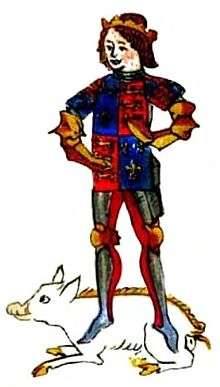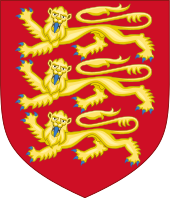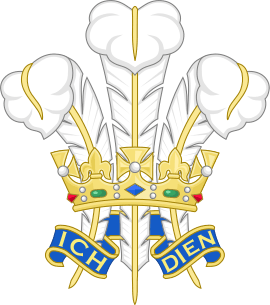Edward of Middleham, Prince of Wales
Edward of Middleham, Prince of Wales, Earl of Chester, Duke of Cornwall, 1st Earl of Salisbury (December 1473 – 9 April 1484), was the son and heir apparent of King Richard III of England by his wife Anne Neville. He was Richard's only legitimate child and died aged ten.[1]
| Edward of Middleham | |||||
|---|---|---|---|---|---|
| Prince of Wales and Earl of Chester, Duke of Cornwall, Earl of Salisbury | |||||
 Edward of Middleham with the White Boar of King Richard III. Illustration from the contemporary Rous Roll | |||||
| Born | December 1473 Middleham, Wensleydale, England | ||||
| Died | 9 April 1484 (aged 10) Middleham, Wensleydale, England | ||||
| Burial | after 9 April 1484 | ||||
| |||||
| House | York | ||||
| Father | Richard III of England | ||||
| Mother | Anne Neville | ||||
| Religion | Roman Catholic | ||||
| English Royalty |
| House of York |
|---|
.svg.png) Armorial of Plantagenet |
| Richard III |
Birth and titles
Edward was allegedly born in December 1473[2] at Middleham Castle, a stronghold close to York that became Richard and Anne's principal base in northern England.[3] The date of 1473 is, however, not universally accepted; Professor Charles Ross wrote that the date 1473 "lacks authority. In fact, he was probably not born until 1476."[4] The act of Parliament that settled the dispute between George of Clarence and Richard over Anne Beauchamp's inheritance just as if the Countess of Warwick "was naturally dead" was dated May 1474.[5] The doubts cast by Clarence on the validity of Richard and Anne's marriage were addressed by a clause protecting their rights in the event they were divorced (i.e. of their marriage being declared null and void by the Church) and then legally remarried to each other, and also protected Richard's rights while waiting for such a valid second marriage with Anne.[6] There were no provisions, however, for their heirs in case of this said divorce, which seems to confirm Richard and Anne had no children as of 1474. However, such provision was the provence of the ruling king for those of royal blood, so would have been moot.
Edward was mostly kept at Middleham, and was known to be a sickly child.[7]
In 1478, Edward was granted the title of Earl of Salisbury, previously held by the attainted George Plantagenet, 1st Duke of Clarence. The title became extinct on his death.[8] His father became King of England on 26 June 1483, deposing his nephew Edward V. Edward did not attend his parents' coronation, likely due to illness.[3] He was created Prince of Wales and Earl of Chester in a splendid ceremony in York Minster on 8 September 1483, following his parents' royal progress across England.[9]
Death
The reasons for his sudden death are unknown. The Croyland Chronicle reads:
However, in a short time after, it was fully seen how vain are the thoughts of a man who desires to establish his interests without the aid of God. For, in the following month of April, on a day not very far distant from the anniversary of king Edward, this only son of his, in whom all the hopes of the royal succession, fortified with so many oaths, were centred, was seized with an illness of but short duration, and died at Middleham Castle, in the year of our Lord, 1484, being the first of the reign of the said king Richard. On hearing the news of this, at Nottingham, where they were then residing, you might have seen his father and mother in a state almost bordering on madness, by reason of their sudden grief.[10]
Edward's sudden death left Richard without a legitimate child and heir.[11] Contemporary historian John Rous recorded that Richard declared his nephew Edward, Earl of Warwick, his heir in his place, but there is no other evidence of this.[12] Similarly, John de la Pole, 1st Earl of Lincoln also seemed to have been designated as Richard's new heir, but was never publicly proclaimed as such.[13]
Richard's enemies were inclined to believe that Edward's sudden death was divine retribution for Richard's alleged involvement in the usurpation and subsequent disappearance of the sons of Edward IV, Edward V of England and Richard, Duke of York.
Burial
.jpg)
The location of Edward's burial is unknown. A mutilated white alabaster cenotaph ("empty tomb")[14] in the church at Sheriff Hutton, with an effigy of a child, was long believed to represent Edward of Middleham, but is now thought to be an earlier work depicting one of the Neville family.[15]
It is perhaps most probable that Edward, having died in Middleham Castle, was buried in the nearby parish church of Saints Mary and Alkelda in Middleham, where his father had intended to found a college. However, evidence for this suggestion is lacking.
In fiction
Edward of Middleham appeared in Sharon Penman's The Sunne in Splendour and in Sandra Worth's The Rose of York series. In the latter series, it is implied that Edward was poisoned at the behest of Margaret Beaufort, as part of her efforts to secure the throne for her son, the eventual Henry VII.
Edward of Middleham is a character in Joan Szechtman's Loyalty Binds Me, her second book about Richard III in the 21st century.
Edward of Middleham also appears in Phillipa Gregory's Cousins' War series, and in the TV adaptation of the novels, The White Queen.
Titles, styles, honours and arms
Titles
- 15 February 1478 onwards:[2] The Earl of Salisbury
- 26 June 1483 onwards:[2] The Duke of Cornwall
- 19 July 1483 onwards:[16] Lord Lieutenant of Ireland
- 24 August 1483 onwards:[2] The Prince of Wales and Earl of Chester
Arms
.svg.png)
From 1483 to 1484, Edward used the arms of his father, debruised with a label of three points Argent.
Ancestry
| Ancestors of Edward of Middleham, Prince of Wales | |||||||||||||||||||||||||||||||||||||||||||||||||||||||||||||||||||||||||||||||||||||||||||||||||||||||||||||||||||||||||||||||||||||||||||||||||||||||||||||||||||||||||||||||||||||||||||||||||||||||||||||||||||||||||||||||||||||||||||||||||||||||||||||||||||||||||||||||||||||||||
|---|---|---|---|---|---|---|---|---|---|---|---|---|---|---|---|---|---|---|---|---|---|---|---|---|---|---|---|---|---|---|---|---|---|---|---|---|---|---|---|---|---|---|---|---|---|---|---|---|---|---|---|---|---|---|---|---|---|---|---|---|---|---|---|---|---|---|---|---|---|---|---|---|---|---|---|---|---|---|---|---|---|---|---|---|---|---|---|---|---|---|---|---|---|---|---|---|---|---|---|---|---|---|---|---|---|---|---|---|---|---|---|---|---|---|---|---|---|---|---|---|---|---|---|---|---|---|---|---|---|---|---|---|---|---|---|---|---|---|---|---|---|---|---|---|---|---|---|---|---|---|---|---|---|---|---|---|---|---|---|---|---|---|---|---|---|---|---|---|---|---|---|---|---|---|---|---|---|---|---|---|---|---|---|---|---|---|---|---|---|---|---|---|---|---|---|---|---|---|---|---|---|---|---|---|---|---|---|---|---|---|---|---|---|---|---|---|---|---|---|---|---|---|---|---|---|---|---|---|---|---|---|---|---|---|---|---|---|---|---|---|---|---|---|---|---|---|---|---|---|---|---|---|---|---|---|---|---|---|---|---|---|---|---|---|---|---|---|---|---|---|---|---|---|---|---|---|---|---|---|---|---|
| |||||||||||||||||||||||||||||||||||||||||||||||||||||||||||||||||||||||||||||||||||||||||||||||||||||||||||||||||||||||||||||||||||||||||||||||||||||||||||||||||||||||||||||||||||||||||||||||||||||||||||||||||||||||||||||||||||||||||||||||||||||||||||||||||||||||||||||||||||||||||
References
- "Official Website of the British Monarchy". royal.gov.uk. Archived from the original on 8 October 2009.
- "- Person Page 10163". thepeerage.com.
- Panton, p. 162-163
- Ross, Charles. Richard III (Univ. of California Press, 1981) ISBN 0-520-04589-0, p. 29, n22, citing P. W. Hammond Edward of Middleham, Prince of Wales (1973) pgs. 12, 35–6, and also T. B. Pugh, Glamorgan County History III (1971) p 687.
- Ross, C.D., Richard III, St. Ives 1981, p.30
- C. Given-Wilson [ed.], Parliament Rolls of Medieval England, Edward IV – October 1472 – 2nd roll
- "Princes of Wales". englishmonarchs.co.uk.
-

- Kendall P.M., Richard III, 1955.
- "Archived copy". Archived from the original on 13 October 2011. Retrieved 3 December 2011.CS1 maint: archived copy as title (link)
- Edward of Middleham at Find a Grave
- Pierce, Hazel, Margaret Pole, Countess of Salisbury 1473–1541 (University of Wales Press, 2009), p. 9.
- Wagner, John, Encyclopedia of the Wars of the Roses, ABC-CLIO, 2001, p. 211-212.
- "Richard III". englishmonarchs.co.uk.
- Routh P. and Knowles R. (1982). The Sheriff Hutton Alabaster Reconsidered. Wakefield Historical Publications.
- "Archived copy". Archived from the original on 21 January 2012. Retrieved 3 December 2011.CS1 maint: archived copy as title (link)
Bibliography
- Kendall, Paul Murray (1955). Richard the Third. Allen & Urwin. ISBN 0-04-942048-8.
- Panton, Kenneth J. (2011). Historical Dictionary of the British Monarchy. Scarecrow Press. ISBN 0-8108-5779-0.
Edward of Middleham, Prince of Wales Cadet branch of the House of Plantagenet Born: December 1473 Died: 9 April 1484 | ||
| English royalty | ||
|---|---|---|
| Vacant Title last held by Edward of the Sanctuary |
Prince of Wales 1483 – 1484 |
Vacant Title next held by Arthur Tudor |
| Peerage of England | ||
| Vacant Title last held by Edward of the Sanctuary |
Duke of Cornwall Earl of Chester 1483 – 1484 |
Vacant Title next held by Arthur Tudor |
| Political offices | ||
| Vacant Title last held by The Duke of Bedford |
Lord Lieutenant of Ireland 1483 – 1484 |
Vacant Title next held by The Marquess Cornwallis |


